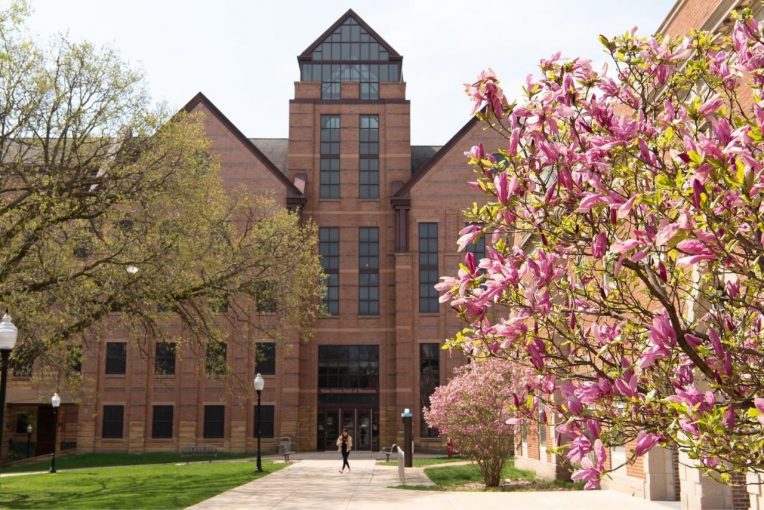Growing up in Thailand, graduating MBA student Paii Chaaum saw firsthand how agriculture is “highly dependent on uncontrollable weather.”
“Farmers lost all their crops due to drought and flood,” the Illinois State University master’s student continued. “Climate change is one of the reasons that the situation has worsened in this past decade. Losses from climate risks can be mitigated by insurance and hedging activities. However, smallholder farmers don’t actively engage in these activities due to several reasons, such as lack of trust, unaffordability, and unfamiliarity. I truly believe that if we can effectively communicate the needs and potential benefits of risk management to the farmers, they will voluntarily opt-in because they rely on their crops for their living and the consequences of a failed harvest are severe.”
Drawing from this personal experience, Chaaum joined a team of Illinois State students taking part in an Innovation Consulting Community (ICC) project devoted to studying the issue of managing climate risks for smallholder farmers in developing countries. Working with the Luxembourg-based Microinsurance Network, the students explored ways to help farmers and their rural communities foster greater resilience and better manage climate-related risks.
Ninety students from thirty sub-disciplines across campus participated in this year’s ICC projects, which are designed to address actual problems for real-world clients by bringing together perspectives and talents from multiple disciplines. The project’s topics for 2020-2021 included such diverse areas of focus as body image, sports marketing, and recycling.
As a junior majoring in both international business and risk management and insurance, the microinsurance-related project brought together Samuel Welker’s interests, and he decided to join the consulting team studying that topic in order to foster a deeper understanding of how to manage weather-related risks.
Ninety students from thirty sub disciplines across campus participated in this year’s ICC projects, which are designed to address actual problems for real-world clients by bringing together perspectives and talents from multiple disciplines.
“You always hear concerns about climate change in the news,” he said. “When I hear these concerns, I think, ‘Okay, so what, if anything, can we realistically do to avoid a complete climate-related catastrophe?’ With this project, I am able to explore that incredibly complex question.”
Along with his fellow team members, he studied insurance and risk management solutions for Ugandan small farmers facing climate change and food security issues.
Jim Jones, ICC mentor and executive director of the Katie School of Insurance and Risk Management, described how the group sought to assess the climate risks and developed a visualization map of the African country so the clients could address the questions, “Where do they put their resources? Where are things working already? Where are the gaps?”
For junior International Business major Hannah Rademaker, participating in the ICC project helped her to understand what it is like to work for an international firm and to better appreciate some of the challenges associated with that, such as planning meetings for people in very different time zones.
“I think this program is really important for ISU to have as it can be a great first step and glimpse into what it will be like working in a more professional setting and can help students learn about something that might not really be of interest to them, but ultimately becomes something that you find really interesting,” Rademaker said. “I think my favorite part of working on this has been knowing that the work myself and my teammates are doing is going to bring a real and tangible impact in some part of the world and someone’s life. The knowledge that I played a part in helping someone has really made this all worthwhile.”
Jones also described how the members of the consulting team developed a number of marketable skills through their participation in the ICC program. Not only did they exercise their communication, presentation, teamwork and critical thinking skills, but for this particular project, the ICC students also honed their research abilities.
Unlike in a classroom setting, Jones noted, “We do not give them a pristine dataset to analyze. They have to go find the data and wrangle it … before they can even analyze it. That’s another skill they are developing.”
Rademaker also discussed how the ICC program offers a different experience from the hypothetical and simulation activities she encounters in the classroom.
“While those projects have certainly been beneficial, working with a real group—or in our case, a few different groups—has made everything feel much more substantial and impactful. I won’t remember all of the simulations I did in my classes, but I will remember the client and the firms that we’ve worked with for this project,” she said.
Welker added, “Real world clients equals real world impact. The opportunity to help an organization attempting to create a valuable insurance product for people in need is rewarding. Working in the real world is different because there isn’t a blueprint or rubric to pull from. We have been given an issue and are trying to figure it out as best we can.”
The open-ended nature of the project “gives students a perspective of how wide risks are and how broad the solutions to managing risks are,” Jones observed.
Illinois State is one of only a few elite universities in the United States offering students the kind of real-world, hands-on consulting experience offered through ICC, and participants in the program are eager to encourage their peers to take part in what it has to offer.
“ICC is for students looking to gain real-world experience and challenge themselves,” concluded Welker. “I’ve gotten to work with professionals, gained valuable experience, and added a couple of nice bullet points to my resume thanks to this program.”
If you are interested in supporting the ISU Innovation Consulting Community, click here.
For more information on the Microinsurance Network, please click here.

